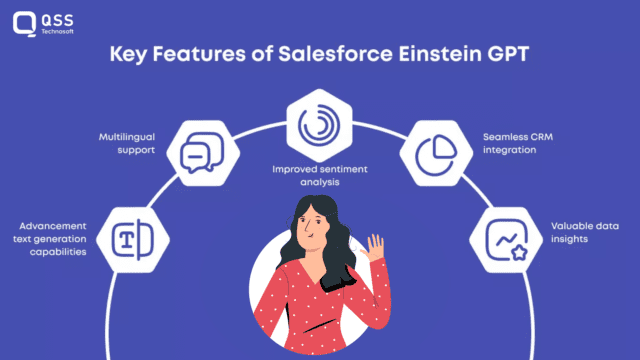Can you imagine a world where every salesperson has a dedicated assistant, equipped with advanced AI and machine learning capabilities, to help them close deals and build strong relationships with customers? It may sound like something out of a science fiction movie, but the future of sales is closer than you think.
Salesforce, the trailblazer in the CRM industry, has always been at the forefront of innovation, constantly evolving to meet the changing needs of businesses. And now, with the integration of AI and machine learning into its platform, Salesforce is taking sales to a whole new level.
Let’s face it, sales can be a challenging and time-consuming process. It requires meticulous data analysis, predicting customer behavior, and staying one step ahead in a highly competitive market. But with Salesforce’s AI-powered tools, sales reps can tap into a wealth of valuable insights and recommendations that can significantly boost their productivity and efficiency.
Now, here’s where it gets interesting. According to a recent study by Salesforce, companies using AI-powered CRM technology have seen a 38% increase in sales productivity and a 45% increase in customer satisfaction. These are not just numbers; they represent real-life success stories of businesses that have adopted AI and machine learning to transform their sales processes.
In this blog, we will explore the future of sales and how AI and Machine Learning are reshaping Salesforce.
Understanding AI and Machine Learning
Before reading into the future of sales, let’s first understand the concepts of AI and Machine Learning. AI refers to computer systems’ ability to simulate human intelligence and perform tasks that usually require human intelligence, such as understanding natural language, recognizing patterns, and making decisions.
Machine Learning, on the other hand, is a subset of AI that uses algorithms and statistical models to enable machines to learn from data without explicitly being programmed.
One such example is Salesforce Einstein, an AI-driven feature that uses predictive analytics to deliver personalized recommendations, scoring leads, and even automating repetitive tasks.
With Einstein, sales teams can identify the most promising leads, prioritize their efforts, and customize their interactions based on the customer’s preferences and needs.
This not only saves time but also ensures that every customer interaction is meaningful and impactful.

Benefits of AI and Machine Learning in Salesforce
Integrating AI and Machine Learning into Salesforce brings numerous benefits to sales teams and businesses as a whole. Some of these benefits include:
Improved Sales Forecasting:
AI and Machine Learning algorithms can analyze historical and real-time data to predict sales patterns, allowing sales teams to make accurate forecasts and plan their strategies accordingly.
For example, the iconic beverage company Coca-Cola used Salesforce Einstein’s AI-powered analytics to gain valuable insights into customer preferences and behavior.
Enhanced Lead Scoring:
AI can analyze customer data to identify patterns that indicate potential high-value leads. By automating lead scoring, sales teams can focus their efforts on leads with the highest chances of conversion, improving efficiency and conversion rates.
For example, T-Mobile used Salesforce’s AI-powered tools to enhance their lead scoring and sales forecasting capabilities.
Intelligent Sales Insights:
AI-powered analytics in Salesforce can provide sales teams with actionable insights and recommendations to optimize their sales processes. This includes identifying cross-selling and upselling opportunities, suggesting the best time to engage with prospects, and providing personalized recommendations to improve customer experiences.
The global hospitality company Marriott using Salesforce’s AI-powered analytics to gain a deeper understanding of customer preferences and behavior.
Automated Sales Processes:
AI and Machine Learning algorithms can automate repetitive sales tasks, such as data entry, lead nurturing, and email communication. This frees up sales teams’ time, allowing them to focus on building relationships and closing deals.
AWS using Salesforce’s AI-powered tools to automate and optimize their sales processes. By using machine learning algorithms to analyze customer data, AWS could identify potential upsell and cross-sell opportunities, resulting in increased revenue and improved customer retention.
Improved Customer Interactions:
By analyzing customer data and interactions, AI can help sales teams understand customers’ preferences, needs, and behaviors. This enables them to deliver personalized and targeted sales pitches, resulting in improved customer satisfaction and increased sales.
Schneider Electric, a multinational energy management company, used Salesforce Einstein Analytics to improve their customer interactions.
Read Our Old Blog : Building Custom Charts and Dashboards in Salesforce
Steps to Implement AI and Machine Learning in Salesforce
Implementing AI and Machine Learning into Salesforce requires a systematic approach. Here are some steps to follow:
Step 1: Define Objectives and Requirements
Clearly define the objectives you aim to achieve with AI and Machine Learning in Salesforce. Identify the specific use cases and requirements for your sales team. For example, you may want to improve lead scoring accuracy or automate certain sales processes.
Step 2: Data Gathering and Preparation
Data plays a crucial role in AI and Machine Learning. Gather relevant data from your CRM system, customer interactions, and other sources. Ensure the data is clean, consistent, and structured for accurate analysis.
Step 3: Choose the Right AI and Machine Learning Tools
Salesforce offers a range of AI and Machine Learning tools, such as Einstein Analytics and Einstein Lead Scoring. Evaluate these tools based on your objectives and requirements. Consider factors like ease of integration, scalability, and the specific features they offer.
Step 4: Integration and Implementation
Work with Salesforce experts or consultants to integrate the chosen AI and Machine Learning tools into your Salesforce platform. Customize the tools to align with your sales processes and configure them for optimal performance.
Step 5: Training and Testing
Train the AI and Machine Learning models using your prepared data. Continuously monitor and evaluate the models’ performance. Collect feedback from your sales team and make necessary adjustments to improve accuracy and effectiveness.
Step 6: Monitor and Optimize
Monitor the performance of your AI and Machine Learning models in real time. Regularly optimize the models to adapt to changing customer behaviors and market dynamics. This includes updating data inputs, adjusting algorithms, and refining models based on feedback.
Read Our Old Blog: Revolutionize Customer Support with Salesforce CRM
Future Trends and Potential Challenges
Did you know: A report by IDC predicts that by 2024, AI-powered CRM activities will generate $1.1 trillion in incremental revenue and create 800,000 net new jobs. These statistics highlight the significant impact and potential of AI in revolutionizing the future of sales. (And this is the actual future trend!)

As AI and Machine Learning continue to evolve, several future trends and challenges are on the horizon in Salesforce:
Increased Automation:
AI and Machine Learning will further automate various sales processes, enabling sales teams to focus on higher-value tasks.
According to a survey conducted by Salesforce, 61% of sales professionals believe that AI is already helping them automate routine tasks.
Sales teams that have implemented AI-driven automation technology have seen an average increase of 22% in lead-to-opportunity conversion rates.
Improved Customer Personalization:
AI will provide even more personalized recommendations and experiences, catering to customers’ unique preferences and needs.
A study by Epsilon found that 80% of consumers are more likely to do business with a company that offers personalized experiences.
According to Salesforce, 70% of consumers expect personalized experiences from businesses based on their interactions.
Predictive Analytics:
AI and Machine Learning algorithms will become more sophisticated in predicting customer behaviors, enabling sales teams to take proactive actions.
A study by Forrester found that companies using predictive analytics to enhance their sales strategies experienced an average increase of 10% to 15% in revenue.
According to the Harvard Business Review, companies that effectively leverage predictive analytics have a 126% better profit per sales lead.
Ethical Considerations:
The use of AI and Machine Learning raises ethical concerns, such as privacy, fairness, and bias. Businesses must address these challenges to maintain trust and transparency.
A survey by Deloitte found that 88% of customers consider security, privacy, and ethical considerations when deciding whether to share their personal information with a company.
According to a study by AI Now Institute, algorithms used in the hiring process can be biased against certain groups, with potential negative impacts on equal opportunity and fairness
Upgrading Workforce Skills:
Sales teams will need to upskill and adapt to working alongside AI and Machine Learning technologies, using their capabilities to deliver exceptional sales experiences.
A report by McKinsey predicts that by 2030, up to 85 million jobs may be displaced by automation, but up to 95 million new jobs may be created, requiring a shift in workforce skills.
Research by the World Economic Forum highlights that skills such as critical thinking, problem-solving, and creativity will become increasingly valuable in the age of AI and automation
Conclusion
The future of sales undoubtedly lies in the integration of AI and Machine Learning into Salesforce. These technologies have the potential to revolutionize the way businesses approach sales processes and enhance overall performance. With the power of AI and Machine Learning, businesses can enhance sales forecasting, improve lead-scoring accuracy, and optimize customer interactions like never before.
By partnering with a trusted technology provider like QSS Technosoft, businesses can unlock the full potential of AI and Machine Learning in Salesforce. QSS Technosoft offers cutting-edge solutions and expertise in implementing these technologies, powering businesses to gain a competitive edge and drive exceptional customer experiences.
With the right approach and preparation, businesses can harness the power of AI and Machine Learning in Salesforce to elevate their sales processes and create exceptional customer experiences. So why wait? Adapt the future of sales with QSS Technosoft and take your business to new heights.
We are proud to mention that our work has been recognized by leading B2B reviews and research platforms like GoodFirms, Clutch, MirrorView, and many more.


The Future of Sales: AI and Machine Learning in Salesforce